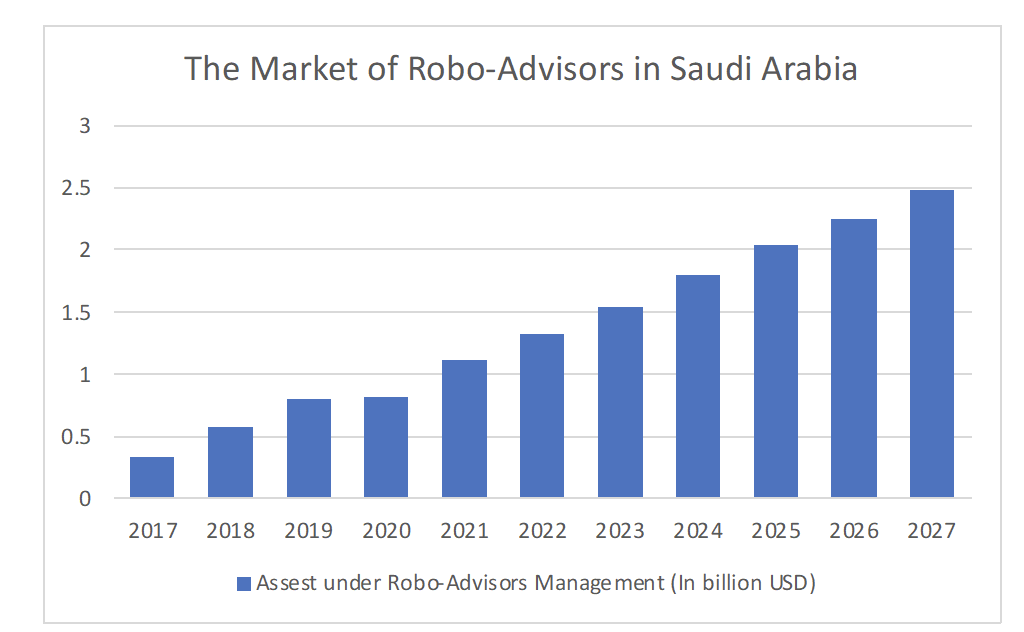Robo-Advisors

What is Robo-Advisor?
Robo-advisors are digital platforms that provide automated, algorithm-driven investment and financial planning services without human involvement.
Robot advisors are also known as "automated investment advisors," "automated investment management," and "digital advice platforms.". The best robo-advisors offer easy account setup, strong goal planning, account services, and portfolio management. Their low fees, security features, and comprehensive education make them a great choice.
What can Robo advisers do?
Through an online survey, a robo-advisor typically asks questions about your financial situation and future goals. You are then offered advice based on the data and your investments are automatically made.
Some robo-advisors offer refined portfolios for socially responsible investing (SRI), halal investing, or tactical strategies that mimic hedge funds. They can also manage sophisticated tasks, such as tax-loss harvesting, investment selection, and retirement planning.
Features offered by robo-advisors:
· Automated investing: You can schedule regular contributions to your diversified portfolio with robo-advisors. It is the platform that decides how your contributions are allocated among your portfolios. Generally, you are not involved in the investment selection process after completing your initial questionnaire.
· Tax-loss harvesting: Investing with robo-advisors can be tax efficient when it comes to tax-loss harvesting. For instance, some robo-advisors offer tax-loss harvesting services, where losing investments are sold tax-efficiently to offset capital gains taxes.
· Socially Responsible Investing: Some robo-advisors offer socially responsible or sustainable options, allowing you to align your investments with your values.
· Risk Assessment: Robo-advisors typically start by assessing your risk tolerance through a series of questions or surveys. Based on your responses, they determine an appropriate asset allocation for your investment portfolio.
· Rebalancing: Robo-advisors regularly monitor and rebalance your portfolio as needed to maintain the desired asset allocation. This ensures that your investments stay in line with your risk tolerance and financial goals.
· Goal-Based Investing: Many robo-advisors allow you to set specific financial goals, such as retirement, buying a home, or saving for education. They can tailor your portfolio to align with these goals and provide projections to track your progress.
Robo-Advisors in Saudi Arabia:
In alignment with the objectives of Saudi Arabia's Vision 2030, aiming to lead in the financial sector, the Capital Market Authority (CMA) has legislatively focused on supporting and regulating the financial technology (Fintech) sector and facilitating its utilization. In August 2019, the Capital Market Authority approved a request from Hassad Investment Company for permission to test the robo-advisory service for the first time in the Kingdom.
Robo-Advisory Companies in Saudi Arabia:
Over recent years, robo-advisory platforms in Saudi Arabia have emerged, experiencing wide dissemination and acceptance, primarily due to their licensing and adherence to Islamic Sharia principles. Their potential returns can reach up to 14%, and they are distinctive for their investment diversification across various assets and the ease of deposit and transfer. Investment typically commences at a range of 1,000 to 500 Saudi Riyals. The appropriate portfolio is determined based on a questionnaire completed upon entering the platform. These platforms include:
Abian Financial:
It imposes an annual fee of 1% and encompasses diversified portfolios that invest in real estate, local and global stocks, and Sukuk. It consists of three portfolios: Growth Portfolio (expected return of 14%), Moderate Portfolio (expected return of 10%), and Conservative Portfolio (expected return of 5%).
Mala'a Tech Financial:
It imposes an annual fee of 0.35% and invests in gold, real estate, Sukuk, and stocks. It comprises four portfolios: Very High Portfolio (expected return of 11%), High Portfolio (expected return of 8%), Medium Portfolio (expected return of 6%), and Safe Portfolio (expected return of 4%).
Tumrah Financial:
It imposes an annual fee of 0.4% or a minimum of 240 Saudi Riyals per year and invests in gold, real estate, Sukuk, and stocks. It includes four portfolios: Adventurous Portfolio (expected return of 10-12%), Risky Portfolio (expected return of 8-10%), Balanced Portfolio (expected return of 6-8%), and Calm Portfolio (expected return of 4-6%).
Growth of the Sector in Saudi Arabia:
The total assets managed by robo-advisory platforms in Saudi Arabia reached approximately $1.33 billion in 2022 and are expected to double by 2027.

Challenges and the Future of Robo-Advisors
In recent years, robo-advisors have gained a lot of interest in the financial world. Individuals can receive tailored financial advice and portfolio management through these automated investment platforms, which use algorithms and data analysis. While they offer several advantages, they also face challenges and have a developing future. Let's examine some of these challenges:
1. Regulatory Framework: The financial industry's regulatory structure is adhered to by robo-advisors. It is critical to comply with legislation such as Know Your Customer (KYC) and Anti-Money Laundering (AML). Robo-advisors must adjust to shifting regulations as the regulatory environment changes and make sure they adhere to all relevant regulations.
2. Human Touch and Trust: Developing trust with investors is one of the biggest hurdles for robo-advisors. When it comes to managing their finances, many people still value interpersonal relationships and professional knowledge. To overcome this obstacle, robo-advisors must effectively convey their value proposition, emphasize their advantages, and provide a seamless combination of technology and human touch.
3. Risk management and market volatility: Robo-advisors rely heavily on historical data and algorithms to make investment decisions. However, market circumstances can be erratic, and sudden changes might affect the performance of investments. To effectively adapt to shifting market dynamics, robo-advisors must continually refine their risk management plans and incorporate real-time data analysis.
4. Data privacy and cybersecurity: Robust cybersecurity safeguards and data privacy are essential since robo-advisors handle sensitive financial information. Robo-advisors must make investments in advanced safety precautions, encryption methods, and frequent audits to safeguard customer information due to the possibility of cyber threats and data breaches.
5. Competition and Distinction: Due to the entry of new companies and well-established financial institutions, the robo-advisor market has grown more competitive. Robo-advisors muststand out in order to succeed by providing distinctive features, specialized investment approaches, or catering to particular niche markets. Long-term success requires the development of a strong brand and the maintenance of a competitive edge.
Looking ahead, the future of robo-advisors is likely to involve the following developments:
1. Hybrid Models: Robo-advisors may use hybrid models, which combine automated algorithms with human financial advisors, to address the issue of trust and offer a more individualized experience. This strategy creates a more comprehensive consulting service by giving investors access to both technology-driven efficiency and human expertise.
2. Added Service Provisions: Robo-advisors might offer financial services including retirement planning, tax reduction, and estate planning in addition to traditional investment management. Robo-advisors can develop into full financial planning platforms that can meet a range of client needs by expanding their service offerings.
3. Machine learning and artificial intelligence:Robo-advisors will use machine learning (ML) and artificial intelligence (AI) approaches to expand their capabilities as technology develops. These technological advancements can enhance portfolio optimization, risk management, and data analysis, resulting in more precise investment recommendations and better performance.
4. Integration of New Technologies: The integration of robo-advisors with advanced technology like blockchain and cryptocurrencies is possible. Investors may have access to additional investment opportunities through this connection, which can also further diversify their portfolios.
5. Global Expansion: Although robo-advisors have experienced rapid growth in some areas, there is still potential for future global expansion. Robo-advisors can grow their businesses to other regions and serve a wider clientele as regulatory obstacles are removed and the demand for digital financial services rises globally.
Overall, although robot advisors face challenges in building trust, complying with regulations, and managing market volatility, their future holds enormous potential.
In conclusion, robo-advisory services offer a convenient and cost-effective investment solution for many individuals. They provide accessibility, diversification, and transparency.However, investors should carefully consider their personal preferences and unique circumstances before choosing robo-advisory services over traditional financial advisors.
Sources:
· https://www.investopedia.com/terms/r/roboadvisor-roboadviser.asp
· https://www.forbes.com/advisor/investing/what-is-robo-advisor/
· https://cma.org.sa/Market/FinTech/Pages/Default.aspx
· https://cma.org.sa/Market/NEWS/Pages/CMA_N_2612.aspx
· https://lenderkit.com/blog/robo-advisors-in-saudi-arabia-and-how-they-work/
·https://twitter.com/ifrhan/status/1655280309175296006s=46&t=jJwHKk06ElQgUQFQEDphlQ
· https://www.statista.com/outlook/dmo/fintech/digital-investment/robo-advisors/saudi-arabia
Prepared by:
Salma Hamidaddin
Lubna Almudaifer
Noura Bin Hawal
